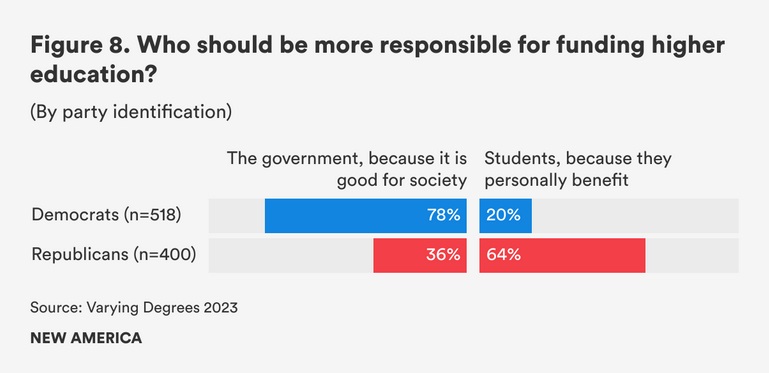While there has been much discussion in recent years about whether a college degree is still necessary for success, a new survey has found that most Americans still see the value in higher education.
That survey, conducted by the left-leaning research organization New America, included responses from nearly 1,500 American adults and asked a series of “core questions,” on topics such as the value of higher education, funding, accountability, and “equity.”
Thirty percent said that a bachelor’s degree is the minimum education needed to be financially stable.The seventh annual survey found that “at least four in five Americans say that it is easier to find a well-paying, stable career if individuals receive any type of education beyond high school.” Thirty percent of adults polled answered that a bachelor’s degree is the minimum level of education needed to be financially stable.
While financial success is thought to be more achievable to those with education beyond high school, survey participants also indicated a belief that those who have completed at least an associate’s degree see benefits in their job satisfaction (55 percent), satisfaction with their community (56 percent), and health (50 percent).
When asked if Americans can obtain a high quality and affordable education after high school, Democrats reported less optimism (50 percent agreeing), while Republicans were slightly more hopeful (60 percent). However, these numbers are higher than the equivalent figures during a previously recorded slump in 2021, when Democrats agreed at only a 41 percent rate, and Republicans agreed at a 58 percent rate.
A resounding theme from this year’s survey concerns the affordability of higher education.A resounding theme from this year’s survey concerns the affordability of higher education. Education costs have been a popular topic of conversation over the past several years as tuition costs have continued to rise and talk of forgiving student debts has raised the hopes of those facing loans.
When asking if funding should be the responsibility of the government or the student, the survey found that 6 in 10 Americans believe that the government should be more responsible for funding higher education. When disaggregated along party lines, the findings were as one might expect: A majority of Democrats (78 percent) favor government funding, and a majority of Republicans (64 percent) favor student funding.
It appears that New America’s survey questions are largely identical each year; however, new this year are questions about equity in higher education. New America justifies these new questions by referencing the Covid pandemic, Black Lives Matter protests, and the overturning of race-conscious admissions policies, as these developments all “amplified the need for support beyond academic and financial assistance to students.” In other words, colleges and universities can no longer simply provide students with an education. They must also ensure that students’ needs are met, a list that seems to grow longer each year.
From career support (88 percent) and financial aid (86 percent) to mental health (81 percent) and general health services (81 percent), Americans largely believe that support should be provided by colleges.
While New America’s survey reveals only a portion of what the general American public thinks about various higher-education topics, it does provide some interesting data points. Higher education still maintains a place of honor in America. However, there is room to reassess issues such as tuition costs and career success after college.
Ashlynn Warta is the state reporter for the James G. Martin Center for Academic Renewal.




